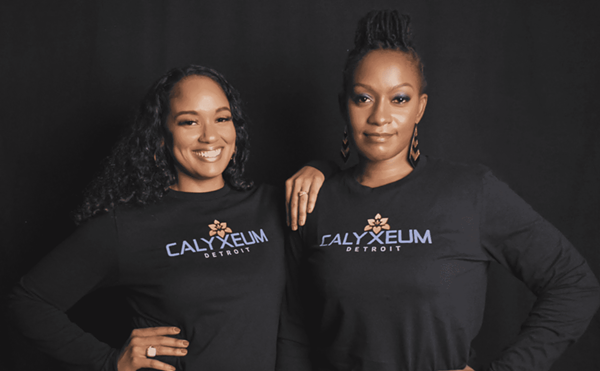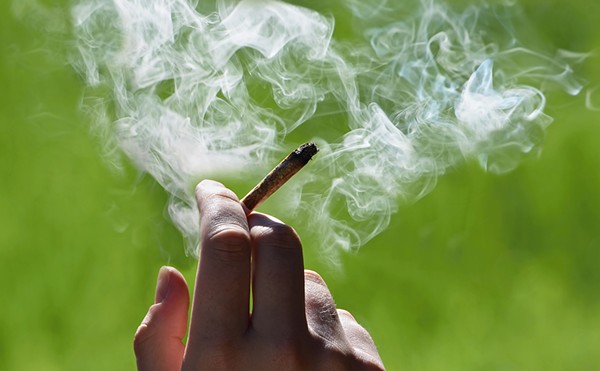State Rep. Rick Olson (R-Saline) made an amazing blog post last month. He had recently attended a luncheon hosted by the Legislative Black Caucus to hear Michelle Alexander, a lawyer and author who teaches at Ohio State University. Olson's post was titled "Medical Marijuana Law Needs Clarification, But Should We Decriminalize Marijuana?"
Part of the post reads: "I have visited a dispensary, and witnessed for myself what appeared to be a service that is needed for both caregivers and patients, in matching them up and recommending appropriate marijuana-based substances in a multitude of forms. I believe there is a place for these dispensaries, properly regulated, and I would support such recommendations if they come out of committee."
Given the attitude against medical marijuana from the state attorney general's office, it seems refreshing that a state representative takes this stance. But it was a subsequent Olson statement that took the post to a different realm: "On a broader note, I am significantly rethinking my opposition to the legalization of marijuana."
Olson isn't the first mind to be changed by Alexander. Her 2010 book, The New Jim Crow, Mass Incarceration in the Age of Colorblindness, examines the mass incarceration of poor people of color in the War on Drugs. It has received the NAACP Image Award and the Constitutional Commentary Award from the Constitution Project at Georgetown University, and continues to make an impact across the country. Her work was instrumental in last year's NAACP resolution calling for an end to the War on Drugs because it is unfairly fought in mostly African-American and Latino communities, creating a permanent underclass and enslaving multitudes in the prison system.
In her acceptance speech at Georgetown, Alexander said: "After years of working on issues of racial profiling, police brutality, drug law enforcement in poor communities of color, and working with people released from prison struggling to 're-enter' a society that never seemed to have much use for them in the first place, I began to suspect that I was wrong about the criminal justice system. It was not just another institution infected with racial bias, but rather a different beast entirely. ... I came to see that mass incarceration in the United States had, in fact, emerged as a stunningly comprehensive and well-disguised system of racialized social control that functions in a manner strikingly similar to Jim Crow."
Jim Crow was a system of racial caste and control that emerged in the late 1800s after Reconstruction and lasted until it was dismantled in the 1960s by civil rights laws. Jim Crow included practices from segregation to lynching. The subtext was that blacks are culturally and intellectually inferior to whites, deserving the treatment they received.
"They have been swept into the system, branded criminals or felons, and ushered into a permanent second-class status — acquiring records that will follow them for life," Alexander wrote of today's practices.
Once arrested for drug possession or dealing members of ethnic minorities are more likely to do prison time than whites, and more likely to receive longer terms. A record for a nonviolent drug offense such as marijuana possession makes one ineligible for federal housing aid and federal education assistance. Incarceration breaks up families, and any career track the felon may have been on is over.
"They cannot get a job," says state Rep. Fred Durhal (D-Detroit), chair of the Legislative Black Caucus. "The reason is on an application. It asks if you have been convicted of a felony. Once a person checks that box, employers usually throw the application in the trash can. We've got to get jobs for people who have served their time. When we can put them back to work the crime rate will go down exponentially. People who are working are too busy to commit crimes."
The history of drug prohibition has been a particularly racial one. President Nixon's War on Drugs was conceived of as a weapon against blacks and radical youths (as Nixon's White House counsel John Ehrlichman admitted years later). In Jim Crow, Alexander recounts how President Reagan ramped up the drug war in the 1980s; law enforcement at the time didn't see drug use as a major problem and pretty much had to be bribed with federal money to go after them. And there is little doubt whom it is being fought against. In the 1980s, crack cocaine use was associated with blacks, and the penalties for crack-related offenses were set far higher for crack than for powder cocaine more associated with whites. Recently those disparities have been eased since studies have shown that the physiological and psychological effects of crack and powder cocaine are the same.
As Alexander points out: "What is painfully obvious when one steps back from individual cases and specific policies is that the system of mass incarceration operates with stunning efficiency to sweep people of color off the streets, lock them in cages, and then release them into an inferior second-class status. Nowhere is that more true than in the War on Drugs."
"I think Michelle Alexander is right on," says Durhal. "Her perceptions are right on. When you look at the Michigan prison system, a lot of what she says is absolutely right. You have more black men in prison today than you have in college. That's reprehensible. That's another form of indentured servitude, slavery, whatever you want to call it. The time we spend incarcerating people we should spend educating them because educated people don't go to prison."
It helps when our representatives in government are willing to be educated too.
"Michelle Alexander's presentation caused me to wonder if the hazards of marijuana use (of which there are clearly some) come close to the damage the criminalization of marijuana use has caused," Olson blogged.
I don't know how far this line of thought goes in the state Legislature, but it seems that an open mind is a start. And starting with marijuana seems an effective way of chipping away at a drug war that has cost us so much in lives and resources.
As long as we're discussing prosecuting drug offenses, another interesting note comes from the HBO series Real Time with Bill Maher. A few weeks ago former New York governor Eliot Spitzer was a guest on the program, and during the overtime segment broadcast online he said, "To spend prosecutorial resources on pot is ridiculous. ... I'd be in favor of legalized pot."






